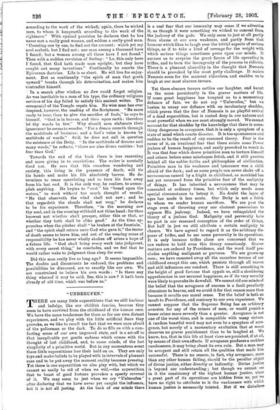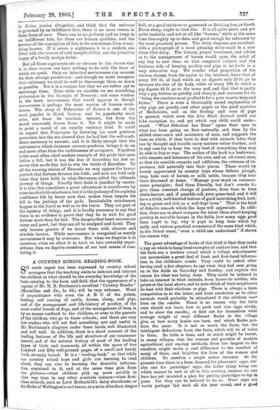" UNBERUFEN."
THERE are many little superstitions that we still harbour and indulge, like our childish fancies, because they seem to have survived from the childhood of the human race. We have the same tenderness for them as for our own distant experiences, and we play with the little artificial fears they provoke, as we like to recall the fact that we were once afraid of the policeman or the dark. To do so fills us with a com- forting sense of our own improved state, and is a set-off to that inexplicable yet gentle sadness which comes with the fhought of lost childhood, and, to some minds, of the lost simplicity of a primitive world. But in any momentous event these little superstitions lose their hold on us. They are only toys and make-beliefs to be played with in intervals of pleasant ease and to be put away the moment reality becomes pressing. Yet there is one superstition we also play with, but which we cannot so easily be rid of when we will,—the superstition that to boast of good fortune provokes a speedy reversal of it. We may seem to jest when we cry " Unbernfen " after declaring that we have never yet caught the influenza, but it is not all jesting. At the back of our minds there
is a real fear that our immunity may cease if we advertise it, as though it were something we wished to conceal from the jealousy of the gods. We only seem to jest at all partly from shame at our own weakness, and partly from that humour which likes to laugh over the trivial aspects of serious things, as if to take a kind of revenge for the weight with which serious things sometimes press upon our minds. It amuses us to surprise the great forces of life operating in trifles, and to turn the incongruity of the process to ridicule. There is a pleasant absurdity in the thought that Nemesis should be provoked by the most petty challenge. It makes Nemesis seem for the moment ridiculous, and enables us to laugh at our most obscure terrors.
Yet these obscure terrors outlive our laughter, and haunt us the more persistently in the graver matters of life. If some great happiness has tempted us to a momentary defiance of fate, we do not cry " Unberiffen," but we hasten to unsay our defiance with an involuntary shudder, which proves that the fear of Nemesis is no playful revival of a dead superstition, but is rooted deep in our natures and most powerful when we are most strongly moved. We cannot account for that shudder by the knowledge that there is some- thing dangerous in arrogance, that it is only a symptom of a state of mind which courts disaster. It is too spontaneous and sudden to be the result of any reasoned theory. Fear is the cause of it, an irrational fear that there exists some Power jealous of human happiness, and easily provoked to wreck it. It was that fear which drove primitive man to torture himself and others before some misshapen fetish, and it still persists behind all the nobler faiths and philosophies of civilisation. Primitive man in his weakness and ignorance was a child afraid of the dark; and as some people can never shake off a nervousness caused by a fright in childhood, so mankind has not yet recovered from the primitive fear of the malignity of things. It has inherited a nervousness that may be concealed at ordinary times, but which only needs some special circumstance to betray it. No doubt the lapse of ages has made it less acute. Our Deity is not a fetish to whom we render human sacrifices. We are past the stage even of throwing away our choicest possessions to appease His jealousy. Indeed, we have relinquished the theory of a jealous God. Malignity and perversity have no part in our reasoned conception of the order of things, But half in jest we still attribute a certain malignity to chance. We have agreed to regard it as the arbitrary dis- poser of trifles, and to see some perversity in its operations. It is only because trifles alone are concerned that we can endure to hold even this theory consciously. Graver matters are ordered by Providence, and the word itself pre- cludes anything malignant or perverse. We are grown-up men; we have reasoned away all the causeless terrors of our childhood except this one, which persists through all reason and still influences our conduct. There is still something in the height of good fortune that appals us, still a shuddering apprehension in our securest happiness, as if its very security were likely to provoke its downfall. We cannot rid our minds of the belief that the arrogance of success is a fault peculiarly obnoxious to heaven, and we avoid it for that reason more than because it revolts our moral sense. Yet the belief is both an insult to Providence, and contrary to our own experience. We cannot suppose that the Supreme Being has an arbitrary aversion for any of the crimes of men, or would punish a lesser crime more severely than a greater. Arrogance is not one of the worst vices, and is compatible with many virtues. A random boastful word may not even be a symptom of arro- gance, but merely of a momentary exultation that at worst deserves no graver punishment than to be laughed at. We know, too, that in this life at least vices are punished, if at all, by means of their own effects. If arrogance produces a reckless carelessness, it may bring about its own ruin. But a man may be arrogant and still retain all the qualities that made him successful. There is no reason, in fact, why arrogance, more than any other human failing, should be the peculiar object of divine justice, either directly or indirectly. Divine justice is beyond our understanding ; but though we cannot see in it the consistency of the highest human justice, since a great part of its operations are hidden from us, yet we have rio right to attribute to it the weaknesses with which human justice is necessarily tainted. But if we disbelieve
in divine justice altogether,. and think that the universe is governed by an indifferent fate, there is no more reason in these fears, of ours. There can he no jealousy and no irony in an :indifferent fate, for these are human qualities, and the essence of the conception of fate is its remoteness from every- thing human. If it seems a nightmare, it is a modern one filled with the terrors of cold inexplicability, not the primitive bogey of a busily malign fetish.
But all these arguments are so obvious to the reason that it is clear reason can have nothing to do with the fears of which we speak. Only an inherited nervousness can account for their strange persistence : and though we must recognise their existence, we shall do well to discourage them as much as possible. Yet it is a curious fact that we are rather apt to encourage them. Even while we shudder we see something picturesque in the thought of Nemesis ; and some wisdom in the mere nervousness that would appease it, though nervousness is perhaps the most unwise of human weak- nesses. The story of Polycrates of Samos is one of the most popular in Greek history, and its popularity must arise, not from its intrinsic interest, but from the moral commonly drawn from it. Yet it might be made to point a. moral of an exactly contrary kind. It could be argued that Polycrates by throwing his most precious possession into the sea showed that he had lost the self-confi- dence necessary to success; and it is likely enough that the nervousness which immense success produces brings it to an end more often than the recklessness of arrogance. Napoleon is the most often cited modern example of the pride that goes before a fall, but it was the fear of hazarding his last re- serves that made him fail to win the battle of Borodino. To all the warning stories of Nemesis we may oppose the braver proverb that fortune favours the bold; and men are bold only when they have faith in what Stevenson called the ultimate decency of things. Usually their faith is justified by results. It is true that sometimes a great adventurer is overthrown by some incalculable mischance, but it is the jealousy of his aspiring confidence felt by lesser men that makes them impute his fall to the jealousy of the gods. Incalculable mischances happen to the timid as well as to the brave. They are part of the mystery of things, and it is hardly necessary to say that there is no evidence to prove that they lie in wait for good fortune more than for bad. The dangers that beset Success are many and great, but they can all be analysed and faced. They only become greater if we invest them with obscure and obsolete terrors. While nervousness is recognised as merely nervousness it may be overcome. But when we disguise it to ourselves, when we allow it to trick us into unworthy super- stitions, then we deprive ourselves of our best means of com- bating it.











































 Previous page
Previous page